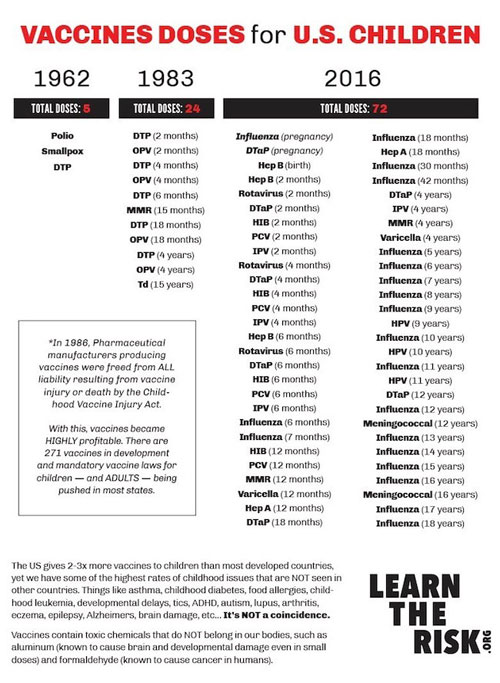50 Vaccine Studies the AAP Failed to Send President Trump (1)

A nonprofit organization calling themselves “Vaccine Safety Commission” that is formed by “concerned scientists, doctors, journalists, and parents” and has no formal affiliation to either Robert F. Kennedy or President Trump, but wholeheartedly endorses the formation of a Vaccine Safety Commission, and claims to be actively seeking additional members.
We are in the dark ages of having honest conversations about vaccine injury where truth-tellers are still routinely destroyed, and this group is another step in the right direction towards honest dialogue.
Consider the case of science journalist and Harvard educated Mish Michaels.
Mish Michaels, who lost her job as a science reporter at WGBH News after questions were raised about her anti-vaccine views, issued a statement saying her personal beliefs ‘have been positioned inaccurately.’
At issue are comments Michaels made before the Massachusetts Legislature in 2011 on behalf of a bill to add parental choice to the list of reasons children without immunizations may attend school.
(Currently, children who aren’t immunized may only attend school if they have documentation from a doctor, or if a parent submits a written statement declaring that immunization conflicts with their religious beliefs.)
At least one group of doctors are going public: a group called Physicians for Informed Consent recently launched in California, speaking up about the importance of keeping vaccines as a voluntary medical procedure.
Physicians for Informed Consent
Regarding President Trump’s desire to look more closely at vaccine safety, there was published an excellent editorial in the British Medical Journal by their Associate Editor, Dr. Peter Doshi, which should really be read by everyone.
Here’s an excerpt:
“It does matter if the vast majority of doctors or scientists agree on something. But medical journalists should be among the first to realize that while evidence matters, so too do the legitimate concerns of patients.”
And if patients have concerns, doubts, or suspicions – for example, about the safety of vaccines, this does not mean they are “anti-vaccine.”
Anti-vaccine positions certainly exist in the world, but approaches that label anybody and everybody who raises questions about the right headedness of current vaccine policies as “anti-vaccine” fail on several accounts.
Firstly, they fail to accurately characterize the nature of the concern. Many parents of children with developmental disorders who question the role of vaccines had their children vaccinated.
Anti-vaccination is an ideology, and people who have their children vaccinated seem unlikely candidates for the title.
Secondly, they lump all vaccines together as if the decision about risks and benefits is the same irrespective of disease-polio, pertussis, smallpox, mumps, diphtheria, hepatitis B, influenza, varicella, HPV, Japanese encephalitis-or vaccine type-live attenuated, inactivated whole cell, split virus, high dose, low dose, adjuvanted, monovalent, polyvalent, etc.
This seems about as intelligent as categorizing people into “pro-drug” and “anti-drug” camps depending on whether they have ever voiced concern over the potential side effects of any drug.”
Thirdly, labeling people concerned about the safety of vaccines as “anti-vaccine” risks entrenching positions. The label (or its derogatory derivative “anti-vaxxer”) is a form of attack.
It stigmatizes the mere act of even asking an open question about what is known and unknown about the safety of vaccines.
Fourthly, the label too quickly assumes that there are “two sides” to every question, and that the “two sides” are polar opposites. This “you’re either with us or against us” thinking is unfit for medicine.
Many parents who deliberate on decisions regarding their children’s health ultimately make decisions – such as to vaccinate or not vaccinate – with lingering uncertainty about whether they were right.
When given a choice, some say yes to some vaccines and no to others. These parents are not zealots, they are decision makers navigating the gray, acting under conditions of uncertainty in perpetual flux.
The AAP Letter
On February 7, 2017, the American Academy of Pediatrics sent a letter to President Trump protesting the establishment of a Vaccine Safety Commission, and included a list of 41 published studies which the AAP believed prove that vaccines are “safe and effective”, and couldn’t possibly be causing American children any harm whatsoever, as they state in their letter.
“Claims that vaccines are unsafe when administered according to expert recommendations have been disproven by a robust body of medical literature.”
It’s interesting about the AAP’s choice of words is that they often seem to be mixing up their words when it comes to “vaccine safety.”
On the one hand, they make statements that are simply unsupportable like expressing their “unequivocal support for the safety of vaccines.” What does that mean, “unequivocal support”?
Does that mean whatever harm they cause is simply worth it, or that absolutely no harm is ever caused? By engaging in generalized hyperbole, the AAP makes it hard to have an honest conversation about the risks vs. benefits of vaccines.
In certain ways the AAP’s letter is laughable. The AAP claims that vaccines are “safe”, but most of the studies they include only address one very specific condition: autism.
What about the growing body of evidence relating the aluminum adjuvant in vaccines to the chronic food allergies our children are experiencing? Never mentioned. What ahout the new HPV vaccine with an alarming rate of adverse events reported? Silent.
What about the data showing that children receiving multiple vaccines have much higher rates of emergency room visits? Not a word. Are vaccines “safe” so long as they don’t cause autism, or does “safety” mean something much broader?
People have traded a reduction in certain acute illnesses (measles, chicken pox) for an explosion in many chronic illnesses, particularly neurological and auto-immune disorders, all of which are now epidemic in our children.
This a simple question to test this hypothesis:
If you have a child between the ages of 4–15, do you know a single classmate of theirs who doesn’t have one or more of the following conditions: autism, ADHD, asthma, anaphylactic food allergy, diabetes, a learning disability, or a sensory processing disorder?
What’s wrong with our kids, why are they so sick, and why isn’t a massive uptick in the number of vaccines given a reasonable hypothesis for what’s happened?
For example it’s interesting this blog post from author, journalist, and nutritionist Catherine J Frompovich where she asks many of these questions:
“If the Rand Corporation found strong evidence vaccines cause Guillain-Barre Syndrome (GBS), myalgia, seizures, meningitis, encephalitis and other adverse health problems, and Robert F Kennedy Jr., Esq. is revealing more and more research – almost daily – this time from the Yale School of Medicine and Penn State College of Medicine about an association between vaccines and brain disorders, then what’s all the ‘tap dancing’ about?
Let’s get to some serious conclusions. Like tap dancing that makes a lot of noise, so too are vaccine studies peripherally pointing to real vaccine concerns about which the U.S. federal health agencies (HHS, CDC and FDA) and state health departments probably won’t do anything to correct, i.e., eliminate vaccines, as some countries are doing with some vaccines.
The ever-increasing – ‘growing like Topsy’ – CDC vaccine schedule has to stop! With almost three hundred new vaccines in production, how many will infants, toddlers and teens be mandated to receive when those vaccines obtain licensure?

Furthermore, aren’t vaccines Big Pharma’s annuity products, so what should consumers expect?”
Read the second part of the article
yogaesoteric
March 23, 2019
